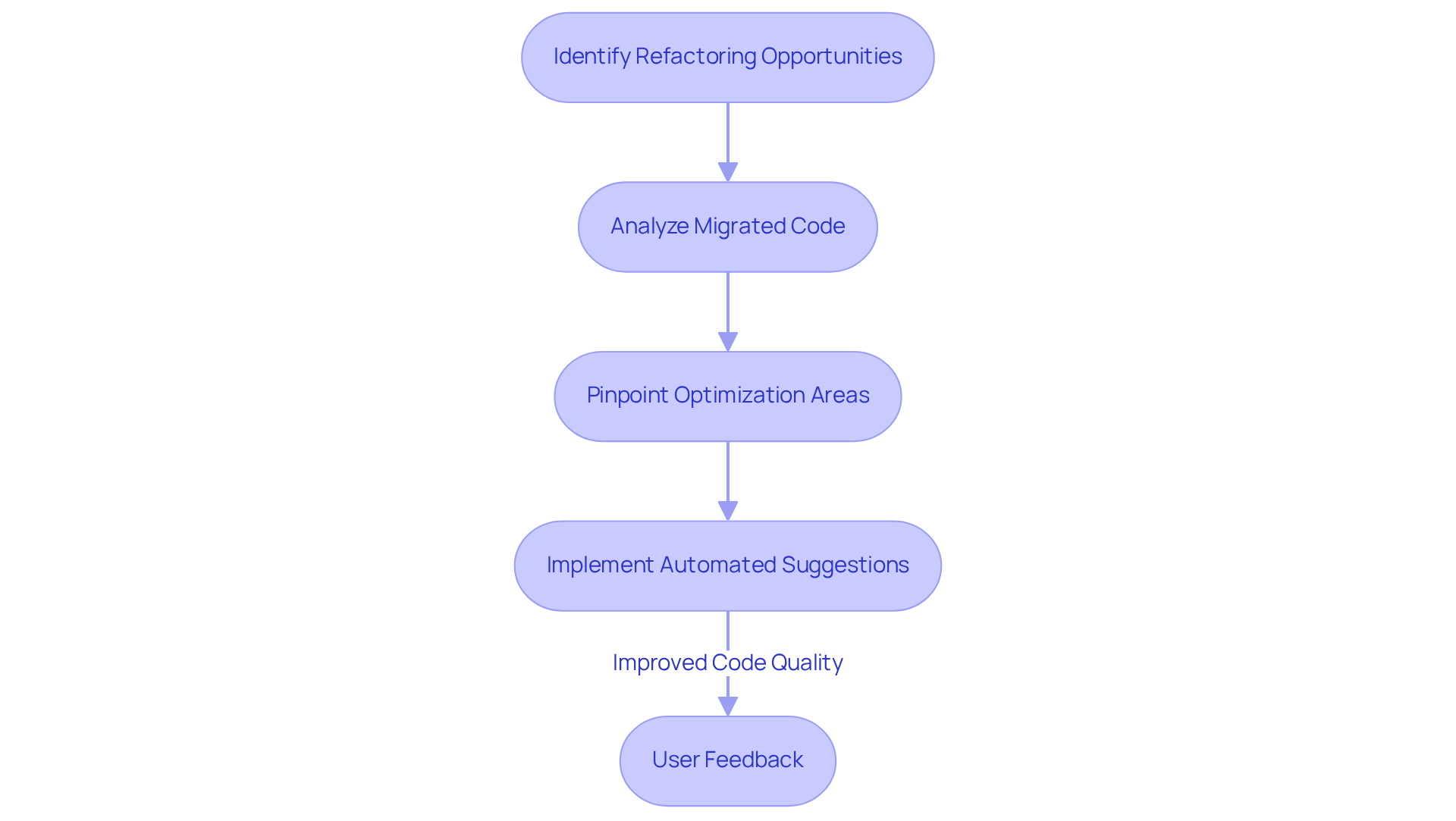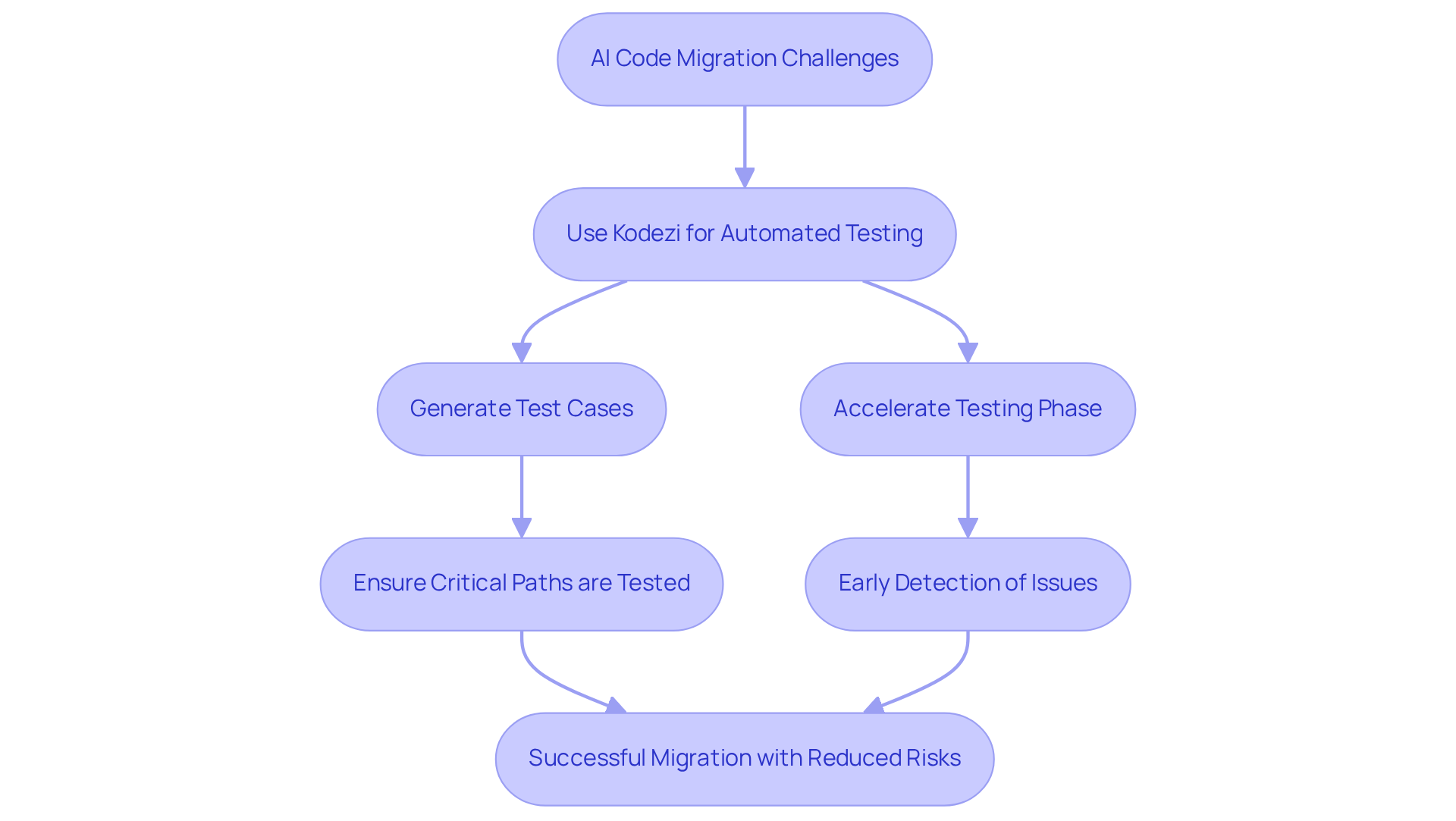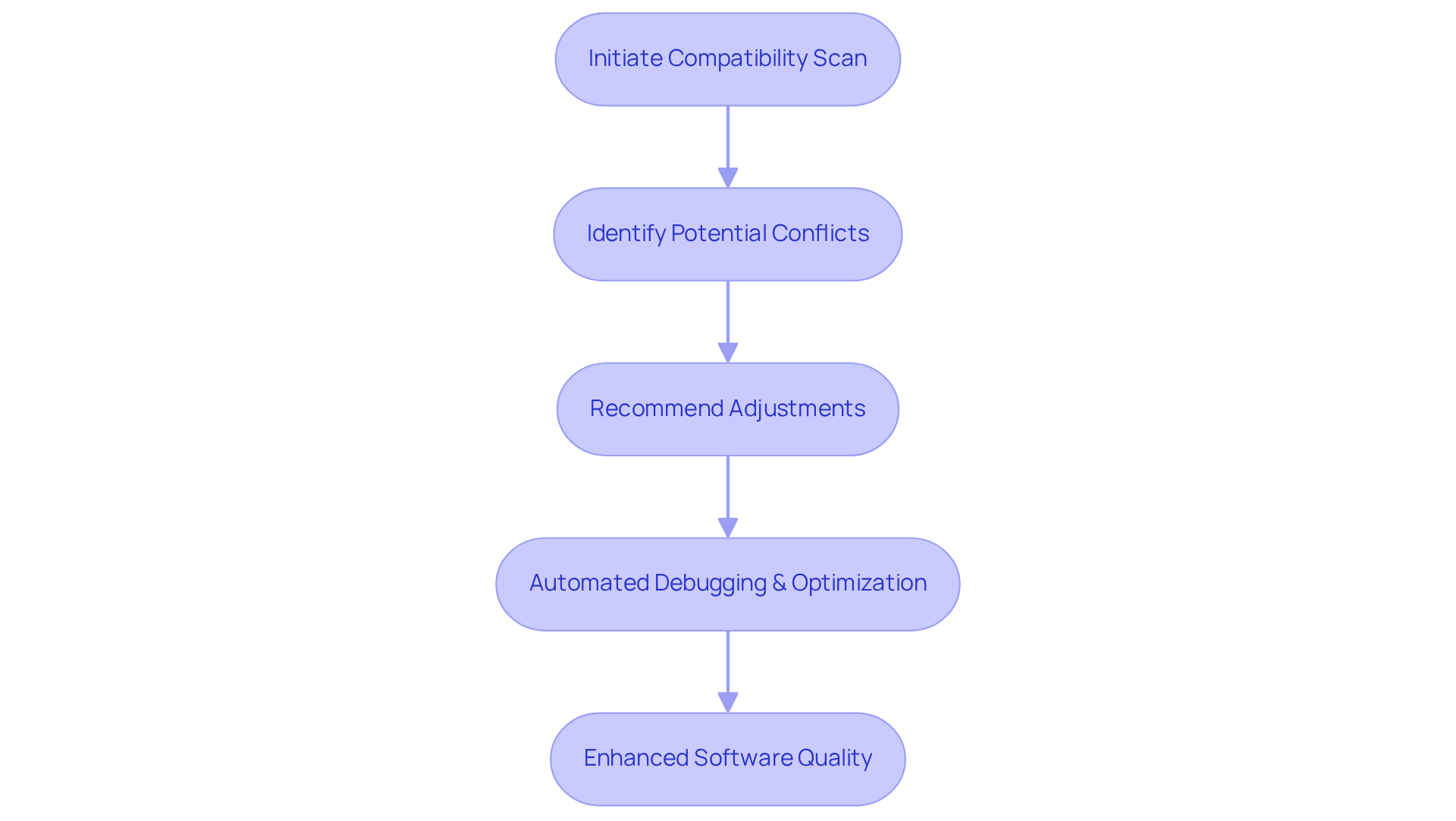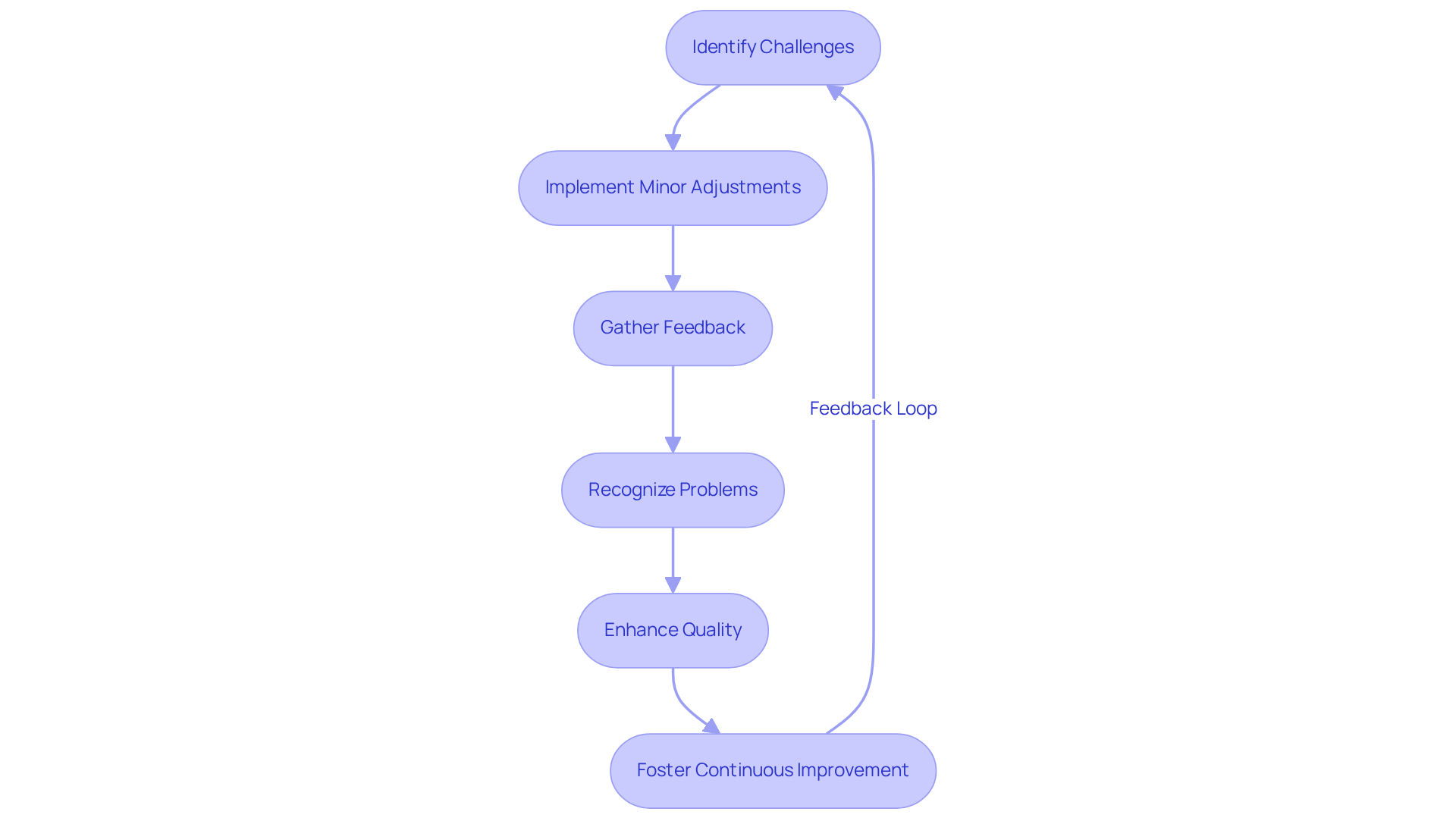Introduction
The landscape of software development is changing fast, and developers are facing significant challenges in code migration. As organizations increasingly turn to artificial intelligence to streamline their processes, the need for effective migration strategies has never been more critical. How can developers transition legacy systems to modern frameworks without sacrificing quality or security?
Enter Kodezi, a tool designed to tackle these challenges head-on. With features that simplify the migration process, Kodezi empowers developers to enhance their coding efficiency. Imagine being able to migrate code seamlessly while ensuring that your projects remain secure and high-quality.
The benefits of using Kodezi are clear:
- Improved productivity
- Better code quality
- A smoother migration experience
By leveraging innovative AI strategies, developers can focus on what truly matters - delivering exceptional software solutions.
So, why not explore the tools available on Kodezi? Discover how they can transform your coding practices and lead to more successful migrations.
Kodezi | Professional OpenAPI Specification Generator - AI Dev-Tool: Automate Codebase Maintenance
Coding challenges can be daunting for developers. Maintaining a clean and compliant codebase often feels like an uphill battle. This is where Kodezi steps in, acting as an independent infrastructure layer that simplifies codebase maintenance.
By seamlessly integrating with platforms like GitHub and CI/CD pipelines, Kodezi automates the generation of OpenAPI specifications, manages documentation updates, and conducts security checks. These features are particularly beneficial during AI code migration projects, where precise documentation is crucial for success.
Imagine a development team that can focus on strategic initiatives rather than getting bogged down by maintenance tasks. Kodezi's self-repairing capabilities tackle programming problems in real-time, allowing teams to enhance productivity and code quality.
Furthermore, Kodezi not only streamlines AI code migration but also fosters a culture of ongoing improvement within engineering teams. Why not explore the tools available on the platform and see how they can transform your coding practices?

AI-Assisted ColdFusion Code Migration: Streamline Legacy Code Transition
Transitioning legacy systems to modern frameworks can be a daunting task for developers. Have you ever faced challenges with outdated code? AI-assisted transfer tools for ColdFusion are here to facilitate AI code migration, significantly reducing the time and effort required for this shift.
Enter Kodezi CLI, a powerful ally in this process. This tool streamlines the evaluation of current programming, effectively detecting compatibility issues and suggesting optimal transition routes. With pre-push quality assurance, Kodezi ensures that potential problems are identified and resolved before deployment. This not only accelerates the transfer process but also minimizes the risk of introducing new bugs, leading to a smoother transition to updated technologies.
Imagine the efficiency gains your team could experience! Organizations leveraging AI code migration for legacy system transformation often see success rates that surpass traditional methods. By utilizing Kodezi, you can expect improved productivity and reduced operational interruptions.
Furthermore, embracing comprehensive testing and iterative transfer strategies is crucial. These practices empower teams to proactively address potential issues and maintain software quality throughout the transition. Why not explore the tools available on the Kodezi platform and see how they can enhance your coding practices?

Traditional Approach: Challenges in Code Migration
Coding challenges can be daunting for developers, especially regarding ai code migration. Traditional methods often rely heavily on manual rewriting and extensive testing during ai code migration, leading to significant time consumption and a high likelihood of errors. Common pitfalls in ai code migration include:
- Compatibility issues, where legacy systems may not align with new environments.
- The risk of data loss during the transfer process.
Furthermore, manual methods can introduce new bugs, compounding existing problems and creating additional hurdles for development teams.
In addition, the lack of automation in ai code migration not only prolongs the transition timeline but also increases costs. This makes it essential for teams to explore more efficient, automated solutions like Kodezi. Kodezi enhances software repositories independently and resolves issues before production, significantly reducing the risks associated with manual transfers. As specialists have noted, the time required for manual transfer can be several times greater than that needed for ai code migration, underscoring the need for innovation in this area.
So, how can Kodezi help? By adopting automation through tools like this, developers can significantly boost programming efficiency and enhance software quality. Imagine a scenario where your team spends less time on tedious transfers and more time on innovation. With Kodezi, you can streamline your processes, reduce errors, and improve overall productivity. Why not explore the tools available on the platform and see how they can transform your coding practices?

AI-Augmented Approach: Enhancing Migration Efficiency
Coding challenges can be daunting for developers, often leading to delays and frustration. Fortunately, Kodezi offers a solution that addresses these issues head-on. By utilizing AI code migration strategies, Kodezi employs machine learning algorithms to analyze codebases and automate the transition process. This means that tools can swiftly recognize dependencies, evaluate compatibility, and implement essential modifications, significantly speeding up transition timelines.
In addition, Kodezi's automated debugging features allow teams to quickly detect and resolve issues within the codebase. This ensures that performance bottlenecks and security vulnerabilities are addressed during AI code migration, thereby enhancing overall code quality. Unlike competitors like Copilot, which primarily focus on coding completion, Kodezi acts as an autocorrect for programming, providing thorough explanations for corrections.
Furthermore, Kodezi places a strong emphasis on user privacy, guaranteeing that all scripts and data remain protected. By minimizing manual intervention, teams can concentrate on higher-level strategic tasks, leading to faster and more reliable AI code migration while ensuring compliance with the latest coding standards.
Are you ready to improve your coding practices? Explore the tools available on the Kodezi platform and experience the benefits of enhanced productivity and code quality.

Identify Refactoring Opportunities: Optimize Migrated Code
Coding challenges can be daunting for developers, especially when it comes to maintaining performance and clarity in their programs. This is where Kodezi steps in, offering AI-driven tools that help identify refactoring opportunities after AI code migration. By examining newly transferred code, Kodezi pinpoints areas for optimization, such as redundant logic and ineffective algorithms.
Users have praised Kodezi for its ability to automatically analyze bugs and provide detailed explanations, making it an invaluable resource for developers. For example, Pradeep from the Indian Institute of Technology Delhi remarked, "This is such a good website for debugging code; I truly appreciate the new updates every week and listening to our feedback!"
During a recent AI code migration project for a multinational healthcare company, Kodezi's solutions were crucial in tackling data integration complexities, ensuring the codebase remained maintainable and scalable. As Krzysztof Bokiej, a Cloud and Big Data Architect, pointed out, "Gaining support and access to specialists is not easy, especially in the case of older technologies and a large technological debt."
By proactively addressing these challenges, teams can significantly enhance the maintainability and scalability of their codebases over time. This approach not only boosts performance but also fosters a cleaner, more organized structure-essential for long-term success in software development.
To fully leverage the advantages of AI tools like Kodezi, teams should implement regular reviews and utilize automated refactoring suggestions. This continuous enhancement of quality can lead to improved productivity and code quality. Why not explore the tools available on the Kodezi platform today?

Generate Test Cases: Validate Migration Success
Developers often find that AI code migration can be challenging, leading to concerns about functionality and reliability. How can these challenges be addressed effectively? Enter Kodezi, a powerful tool that leverages AI to streamline the testing process. By automatically generating thorough test cases that mirror the original code's behavior, Kodezi ensures that all critical paths are rigorously tested.
Furthermore, this approach not only accelerates the testing phase but also instills confidence in the transition's success. Early detection of potential issues means teams can address problems before they escalate. Imagine reducing the risk of post-transition defects significantly - this is what Kodezi offers.
In addition, incorporating automated testing into your AI code migration strategy leads to a smoother process overall. Why settle for uncertainty when you can enhance productivity and code quality? Explore the tools available on Kodezi's platform and see how they can transform your coding practices.

Compatibility Scan: Ensure Seamless Integration
A compatibility scan is essential in the ai code migration process. It ensures that newly migrated software integrates seamlessly with existing systems and frameworks. Have you ever faced coding challenges during ai code migration? Kodezi addresses these issues head-on with its AI-assisted development tool, which automates the ai code migration process. This tool promptly identifies potential conflicts and recommends necessary adjustments.
Furthermore, by utilizing Kodezi's automated debugging and optimization features, teams can proactively tackle compatibility issues related to ai code migration. This approach not only prevents costly delays but also ensures a smoother transition. Imagine the efficiency gains when you can focus on development rather than troubleshooting!
In addition, this process maintains security best practices and programming standards, ultimately resulting in enhanced software quality. By using Kodezi, developers can improve productivity and code quality significantly. Why not explore the tools available on the platform and see how they can transform your coding practices?

Security Vulnerability Scan: Protect Your Codebase
Are you facing challenges in ensuring the security of your AI code migration? Conducting a security vulnerability scan is crucial to protect your codebase from potential threats.
Kodezi CLI steps in as a powerful ally, automatically analyzing migrated programs for known vulnerabilities and compliance issues. This tool delivers actionable insights that empower teams to effectively address security gaps.
Furthermore, this autonomous solution not only boosts programming productivity but also features automated debugging to resolve issues before they reach production. By prioritizing security during the AI code migration, organizations can safeguard their applications and maintain user trust and confidence in their systems.
In addition, this proactive approach ensures that codebases remain resilient against evolving threats, ultimately enhancing overall software integrity. Why not explore the tools available on the Kodezi platform to elevate your coding practices?

Iterative Approach: Continuous Improvement in Migration
Coding challenges can often feel overwhelming for developers. Embracing a repetitive method for ai code migration allows teams to break the process into manageable stages, facilitating ongoing feedback and enhancement. By applying minor, gradual adjustments, teams can swiftly recognize and tackle problems, ensuring that the transfer stays on course.
Furthermore, this flexibility not only enhances the overall quality of the transition but also fosters a culture of continuous improvement within the development team. Imagine how much more efficient your coding practices could be with a structured approach!
In addition, Kodezi addresses these challenges by providing tools that streamline the ai code migration process. With features designed for real-time collaboration and feedback, developers can work together more effectively, leading to improved productivity and code quality.
Similarly, by utilizing Kodezi, teams can experience significant gains in efficiency. The benefits of using this platform are clear: enhanced communication, reduced errors, and a more cohesive development process.
So, why not explore the tools available on Kodezi? Discover how they can transform your coding experience and lead to better outcomes for your projects.

Generate Migration Documentation: Maintain Clarity for Future Development
Creating detailed transition documentation is crucial for developers facing coding challenges. Have you ever struggled with continuity in your projects? Kodezi's collection of developer resources can help streamline this process. By documenting alterations made during transitions, Kodezi ensures that all changes are clearly noted, making it easier for teams to collaborate.
With Kodezi, you can automate code evaluations and maintain API documentation that aligns with code modifications. This not only serves as a valuable asset for current collaborators but also significantly reduces the learning curve for new developers. As Brett Shavers aptly puts it, "if something isn't documented, it essentially didn't happen." This highlights the critical nature of thorough documentation in development.
Furthermore, the lack of adequate documentation can lead to substantial difficulties, as emphasized by Harlan Carvey's experiences. Careful record-keeping during transitions is essential. By leveraging Kodezi's capabilities, teams can effortlessly generate OpenAPI 3.0 specs and Swagger UI documentation, ensuring that all aspects of the migration are well-documented and accessible.
In addition, consider how much more productive your team could be with the right tools at their disposal. Explore Kodezi today and see how it can enhance your coding practices!

Conclusion
Embracing innovative AI code migration strategies can significantly enhance the efficiency and success of software transitions. Developers often face numerous challenges during code migration, from compatibility issues to security vulnerabilities. How can they navigate these complexities effectively? By leveraging tools like Kodezi, developers can tackle these challenges head-on, ensuring their projects remain on track and free from the pitfalls commonly associated with traditional methods.
Kodezi offers a range of features designed to streamline the migration process. For instance, automation of codebase maintenance and AI-assisted legacy system transitions simplify the often daunting task of migrating code. Furthermore, thorough documentation is emphasized, ensuring that every step of the process is clear and well-recorded. Each approach highlights the necessity of proactive measures, such as compatibility scans and security vulnerability assessments, to safeguard the integrity of the code throughout the migration process.
In addition, the iterative approach fosters continuous improvement. This allows teams to adapt and optimize their practices over time, leading to enhanced productivity and code quality. In a rapidly evolving technological landscape, the adoption of AI tools like Kodezi is not just beneficial but essential for maintaining a competitive edge. Developers are encouraged to explore the capabilities of Kodezi, which streamlines code migration and enhances overall productivity.
By prioritizing automation and strategic planning, teams can focus on innovation rather than getting mired in the challenges of code migration. Ultimately, this leads to more successful outcomes in their projects. So, why not take the next step? Explore the tools available on Kodezi and see how they can transform your coding practices.
Frequently Asked Questions
What is Kodezi?
Kodezi is a professional OpenAPI specification generator that acts as an independent infrastructure layer to simplify codebase maintenance for developers.
How does Kodezi assist with codebase maintenance?
Kodezi automates the generation of OpenAPI specifications, manages documentation updates, and conducts security checks, helping to maintain a clean and compliant codebase.
What platforms does Kodezi integrate with?
Kodezi seamlessly integrates with platforms like GitHub and CI/CD pipelines.
What are the benefits of using Kodezi during AI code migration projects?
Kodezi provides precise documentation, enhances productivity, and improves code quality, allowing development teams to focus on strategic initiatives rather than maintenance tasks.
What is the Kodezi CLI?
Kodezi CLI is a tool that streamlines the evaluation of current programming during legacy code migration, detecting compatibility issues and suggesting optimal transition routes.
How does Kodezi ensure quality during code migration?
Kodezi incorporates pre-push quality assurance to identify and resolve potential problems before deployment, minimizing the risk of introducing new bugs.
What challenges do traditional methods of code migration present?
Traditional methods often involve manual rewriting and extensive testing, leading to time consumption, high error rates, compatibility issues, and the risk of data loss.
How does Kodezi improve the code migration process compared to traditional methods?
Kodezi enhances software repositories independently, automating the migration process, which significantly reduces risks, time, and costs associated with manual transfers.
What impact can Kodezi have on a development team's productivity?
By automating code migration and maintenance tasks, Kodezi allows development teams to spend less time on tedious transfers and more time on innovation, leading to improved productivity.




